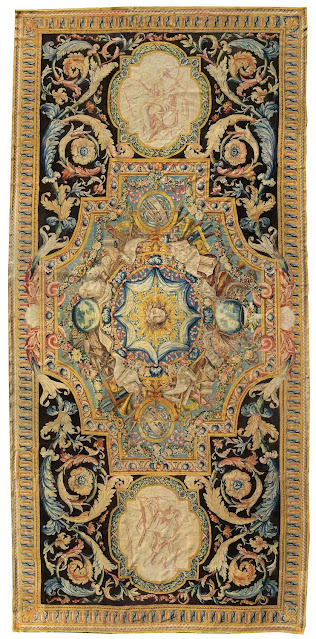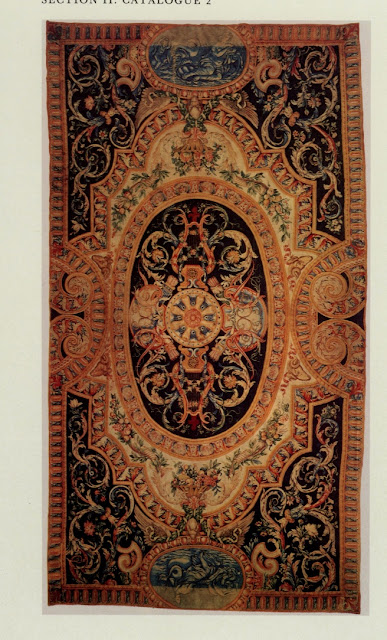Imagine a walkway some 13 metres wide and 442 metres long-covered in carpets.
 |
| in 1615 |
This was the ambitious plan presented to Louis XIV by his minister Colbert to furnish the space stretching between the Louvre(at that time the king`s residence) to the Tuilleries Palace and its garden.
The carpets were woven in a disused soap factory which came to be known as the Savonnerie.
Two families,the Dupont and the Lourdet,vied for the commissions.The designs were overseen by the King`s painter Charles Le Brun together with a group of leading artists.
Initially,13 carpets were woven for the Galerie d `Apollon, followed by 93 for the Grande Galerie(actually 92,as one,Nr 36,was never produced)Work begun in 1665 with the designs.Weaving commenced in 1668,and the entire project took around twenty years.At some point along the way the King lost interest as his attention turned to Versailles,and the carpets were assigned to storage.
The entire assembly seems never to have been shown in place.A number of carpets were presented as gifts,to the Persian and Turkish ambassadors,to the Swedish Royal House-even to the King of Siam.
During the revolution some of the carpets were bartered for horse-feed and their royal insignia were often cut out and replaced with more mundane decoration.
Some 40 pieces remain in the Mobiler National and others are scattered worldwide.
_(22287914199).jpeg) |
| The Long Gallery |
The entire surface area is said to have covered around 3,700 square metres,with a standard length of just under 9 metres.Years were spent foraging for the right quality of wood to build the looms.The Savonnerie building was enlarged to accomodate them and an army of orphans was pressganged into service,many of whom subsequently fled.
The present photo-essay builds on the work of Pierre Verlet, whose catalogue to the Rothschild Collection ("Waddesdon")is a history of the Grande Galerie enterprise.Verlet`s publication is one of the great carpet books.In 2012 Wolf Burchard published an update to the list of surviving examples.
Woven uniformly on a brown-black ground,the carpets echo the design system employed by the Mamluks in their large productions: a dominant central medallion accompanied by two satellites.The French examples replace the minor medallions with bas-reliefs featuring either landscapes or mythological characters. A border of Gadroons and blue leaves was standard on all examples.According to Susan Sherill, the carpets were woven sideways,allowing many more weavers to work on each carpet,thus speeding up the operation considerably.Although woven with the Turkish knot,the depressed warp structure is more akin to the Persian world,or indeed to that of the Mamluks.Colbert had attempted to acquire oriental carpets as early as 1662, but such a large quantity was not forthcoming.This is presumably why he went ahead with local production.Not much investigation has been carried out regarding the dyes used.The Savonnerie had their dyework outsourced, unlike the Gobelins where it was part of the manufacture.Cochineal,madder,indigo(or woad?) and local yellow dyes were employed.It can be assumed that the brown-black ground colour common to all examples was produced by overdying natural dark brown wool.
Carpets for the Galerie d `Apollon.
13 carpets for this space were delivered on 7 October 1667. 4 complete examples survive, and 8 fragments.The series can be considered as a dry run, made on the first giant looms set up at Chaillot.
 |
| GdA1 & 2 |
 |
| GdA3(Louvre) |
 |
| GdA4(Stavros Niarchos,Paris) |
 |
| GdA5 & 6-Fragments from the first carpet in the series-left:Mobilier national;right. Notre Dame |
 |
| GdA7-At Christies in 2018 |
 |
| GdA8 -Mobilier national 1531 |
 |
| GdA9-Mobilier national 2881 |
 |
| GdA10-Mobilier national 1345 |
 |
| GdA11-Mobilier national 10159 |
 |
| GdA12-Sothebys 2017 |
The borders on the carpets for the Galerie d `Apollon were simplified for the larger series.
 |
| after Verlet,figure 121 |
 |
| Francesca Galloway |
Carpets for the Grande Galerie.
Nr.1
%20da%20Burchard%20copy.jpg) |
| Palazzo Reale,Naples |
 |
| Nr 1 |
 |
| Nr 1 |
Nr.2
 |
| Lempertz 29.5.2020-927 |
Nr 5 or 17
 |
| Louvre OA5432 |
Nr 6
 |
| Mobilier national 6304 |
Nr 9 or 19
 |
| Mobilier national 6304 |
Nr 10 or 14
 |
| Catan Collection,later at Christies |
Nr 11
 |
| Metropolitan Museum 52.118 |
Nr 11
 |
| Huntington Art Gallery |
 |
| Mobilier national 4062 |
15
 |
| Mobilier national 10157 |
Nr 16 or 26
 |
Mobilier national 12362
|
Nr 17
 |
| Louvre 5432 |
Nr 19 or 9
 |
| Mobilier national 16019 |
Nr 20
 |
| Louvre 2267 |
Nr 21
 |
| Louvre 6735 |
Nr 22
 |
| Mobilier national 4061 |
Nr 23
 |
| Huntington Art Gallery |
Nr 26 or 16
 |
| Philadelphia Museum of Art |
Nr 28 or 6
-Savonnerie%20-Mobilier%20national-%206978-grand%20galerie%2028%20copy.jpeg) |
| Mobilier national 6978 |
Nr 29 or 33
 |
| Mobilier national 2013 |
Nr 34 or 15
 |
| Louvre |
Nr 38
 |
| Metropolitan Museum 58.75.129 |
Nr 40
 |
| Mobilier national 2012 |
Nr 43
 |
| Sothebys-Christies |
nr 44
 |
| Christies 2021-formerly Garcia Collection |
Nr 46
 |
| Mobilier national 2022 |
Nr 48
 |
| Etude Couturier Nicolya Paris 1993 |
Nr 49
 |
| Mobilier national 4060 |
Nr 50
 |
| Nissim Camondo,Paris |
 |
| Nissim Camondo,Paris |
Nr 51
 |
| Mobilier national 2021 |
Nr 53
 |
| Mobilier national 2037 |
Nr 54
 |
| Mobilier national 1345 |
Nr 55
 |
| Mobilier national 2023 |
Nr 56
 |
| Mobilier national 2027 |
Nr 57
 |
| Waddesdon |
Nr 58
 |
| Mobilier national 2036 |
nr 59
 |
| Mobilier national 2016 |
Nr 60
 |
| Pitti Palace |
Nr 61or 89
 |
| Ex-Deering Collection, sold at Christies in 2000 for $1,326,000 |
Nr 62
 |
| Mobilier national 2017 |
Nr 64
 |
| Mobilier national 2018 |
Nr 65
 |
| Mobilier national 2024 |
Nr 67
 |
Mobilier national 14041
|
Nr 68
 |
| Mobilier national 2032 |
Nr 69
 |
Mobilier national 2028
|
Nr 70
 |
| Mobilier national 2025 |
Nr 72
 |
| Ex-Getty |
Nr 73
 |
| Wrightsman Collection MET 1976.155.114 |
Nr 74
 |
| Mobilier national 74 |
 |
| Mobilier national 74 |
Nr 75
 |
| Mobilier national 2034 |
Nr 76
 |
| Mobilier national 14039 |
Nr 77
 |
| Mobilier national 14040 |
Nr 78
 |
| Mobilier national 2067 |
Nr 82
 |
| Mobilier national 20471 |
Nr 83
 |
| Mobilier national 2035 |
Nr 84
 |
| Mikaeloff |
 |
| Mikaeloff |
Nr 85
 |
| Mobilier national 2020 |
Nr 88
 |
| Mobilier national 6776 |
Nr 92
 |
| Waddesdon |
Nr 93
 |
| Mobilier national 2015 |
Verlets plan of the Grand Galerie carpets in formal layout

_(22287914199).jpeg)












%20da%20Burchard%20copy.jpg)


















-Savonnerie%20-Mobilier%20national-%206978-grand%20galerie%2028%20copy.jpeg)






























